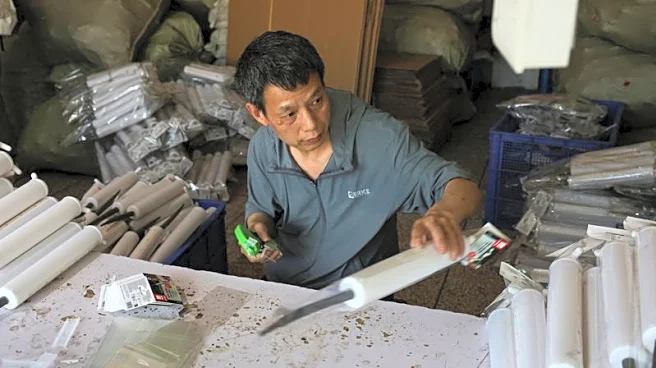By Joe Cash
BEIJING (Reuters) -China's factory activity likely contracted for a fifth straight month in August, with manufacturers awaiting more clarity on a trade deal with the U.S. while a wobbly job market and a property crisis curb domestic demand, a Reuters poll showed.
The survey of 21 economists forecast the official purchasing managers' index (PMI) would edge up to 49.5, up from July's 49.3, remaining below the 50-point threshold that separates growth from contraction in activity. The data
is due on Sunday.
This trifecta of problems - pressure on China's exports, a property slump squeezing household spending and rising job uncertainty - is just China's headline concerns, economists say. Extreme weather and cash-strapped local authorities are also putting Beijing's ambitious 2025 growth target of "around 5%" in jeopardy.
The highest poll reading was 49.5, cited by more than half the respondents, while the Economist Intelligence Unit gave the lowest forecast of 49.0.
"The summer months tend to be the low point in the year, and this year there's additional pressure from extreme weather and production limitation," said Xu Tianchen, senior economist at the Economist Intelligence Unit.
"Activity should improve in September and October."
While July exports beat forecasts, the gain was supported by a low base and driven by a surge in shipments to Southeast Asia, as Chinese exporters scramble to grow market share there amid fears of losing access to the U.S., the world's top consumer market - a push some producers have called a "mad rat race."
Earlier this month, the U.S. and China extended their tariff truce for another 90 days, locking in place levies of 30% on Chinese imports and 10% Chinese duties on U.S. goods, but the uncertainty is eroding confidence on both sides of the Pacific.
Profits at China's industrial firms fell for a third straight month in July, official data showed on Wednesday, highlighting how businesses are also struggling with subdued demand and persistent factory-gate deflation at home, keeping the pressure on Beijing to roll out more stimulus.
Policymakers have ramped up consumer subsidies, but a prolonged property slump is still crimping spending, with real estate a key store of household wealth.
Households' reluctance to take out mortgages was reflected in July bank lending data, which unexpectedly contracted for the first time in 20 years.
And consumer spending could take a further hit if a recent ruling by China's top court banning firms and employees from skirting social insurance payments leads to job losses, with many companies and workers already struggling to make ends meet. Urban unemployment edged up to 5.2% from 5% last month.
The decision should support cash-strapped local authorities - deprived of land-sale revenue - in replenishing depleted pension coffers, as demands on public finances continue to grow. Extreme weather alone, for instance, has caused $2.2 billion in road damage since July 1.
Analysts polled by Reuters forecast the private sector RatingDog PMI to come in at 49.7, up from 49.5 a month prior. The data will be released on September 1.
(Reporting by Joe Cash; Polling by Vijayalakshmi Srinivasan and Devayani Sathyan in Bengaluru and Jing Wang in Shanghai; Editing by Jacqueline Wong)















